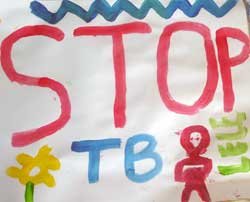Surge in TB cases: Top govt officials lament the lack of awareness
March 31, 2014 | Monday | News | By Rahul Koul Koul
Surge in TB cases: Top govt officials lament the lack of awareness
The increased incidents of MDR-TB and XDR-TB has alarmed the public health agencies and government! (Photo credits: CDC )
India has the highest burden of TB in the world, an estimated 2 million cases annually, accounting for approximately one fifth of the global incidence. It is estimated that about 40% of the Indian population is infected with TB bacteria, the vast majority of whom have latent rather than active TB disease. It is also estimated by the World Health Organisation (WHO) that 300,000 people die from TB each year in India.
Dr R S Gupta, director general, Revised National Tuberculosis Control Programme (RNTCP), recently in his highly passionated speech talked about the need to speard awareness about TB on the ground level. "TB in initial days can be cured if the treatment is followed regularly but unfortunately in India it is not so. People choose to ignore it and refuse to take medication, leading to multi drug resistance TB (MDR-TB). That also raises the cost of treatment and level of disease as well," said Dr Gupta who spoke at the Economic Times healthcare summit held at New Delhi.
Traditionally the view in India had been that MDR TB is not easily transmissible and that most drug resistant TB arises from the failure of people to take their drugs properly, rather than from them becoming infected with an MDR TB strain. Therefore a high quality DOTS program, and supervising people taking their drugs should prevent the emergence of resistance.
The RNTCP has tried to involve non public health providers in promoting TB care, but it is believed that many patients continue to seek treatment elsewhere and currently go unreported. Whilst national data for India is not available a number of studies and surveys of TB prevalence including self reporting of TB prevalence have suggested that up to 46% of patients may not be currently reported.
There is a close relationship between TB and HIV-AIDS as the latter gives an opportunity for it to attack a fragile immune system. Mr V K Subburaj, secretary, Department of AIDS Control, in his keynote address at the same event remarked, "It is unfortunate that the private hospitals don't come forward to enlist on the TB control programme. Six thousand kits freely available by the government but we still see the cases in millions every year. The lack of awareness despite government attempts has indeed been a cause of concern."
On 11 Oct 2013, Indian Pharmacopoeia Commission (IPC) and Revised National Tuberculosis Control programme (RNTCP) decided to work together to monitor the safety of antitubercular drugs. Indian Pharmacopoeia Commission is working as National Coordination Centre (NCC) for Pharmacovigilance Programme of India (PvPI) by collecting the ADRs
across the country through their ADR monitoring centres.









